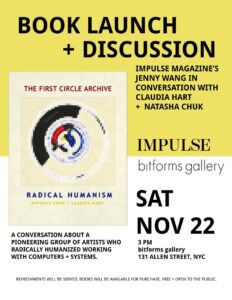
The First Circle: Radical Humanism is an archaeological project focusing on a pioneering generation of artists whose early adoption of computers lay the foundation for contemporary digital art. The publication brings together this group of 37 artists and their bodies of work, representing a wide-range of approaches and technologies including computer drawings, 3-D animations, machinima, installation, sculpture, holograms, mixed-media, photography, video, robotics and more.
The First Circle: Radical Humanism began with intermedia artist Claudia Hart’s personal quest for identity and a desire to connect her own story to a broader historical context. This search resulted in a set of criteria emerging from her own life yet demarcating a type of artist who she felt reflected the pioneering spirit of her own generation. According to Hart’s rule set, artists must be born between 1945 and 1960, coming of age in America during the tech-industry explosion that took place during that era. These artists do not work with a documentary or social justice approach; were not trained as computer or engineers nor embraced scientific methods; produced images which were post-photographic rather than abstract and algorithmic; and above all, integrated computers as a significant force in their practice in the period between 1995-2005.
Hart’s schema located a group of disparate artists running on parallel creative tracks, bridging experimental film, video, audio, photography, painting, sculpture, and more. The findings of this rubric identifies a first circle of artists working with computers, but also working in free-wheeling, unexpected ways toward the creation of uncanny, symbolic, expressive, and ultimately humanistic art works. Tracing the origins of this post-war generation of artists also tells the story of the foundations of contemporary digital art through the voices and testimonials of an eclectic group who dared to create an unlikely creative path with computers and systems. As such, this project seeks to expand the current discourse on the history of digital art — highlighting the evolution of digital creativity outside of the framework that triangulates science, technology and industry — to demonstrate its relevance in today’s artistic landscape.
Please purchase a copy of Radical Humanism here.